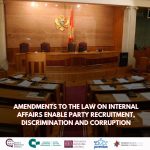29/3/2011 Deportation of refugees war crime case first instance criminal court ruling
29/03/201113/04/2011 Joint position in favor of full decriminalization of insult and defamation
13/04/201104/04/2011 HRA OPINION ON THE GOVERNMENT PROPOSAL TO RELEASE JOURNALISTS AND EDITORS FROM CRIMINAL LIABILITY FOR INSULT AND DEFAMATION THROUGH THE MEDIA
Although the Ministry of Justice, in accordance with the explicit formulation of the Action plan for monitoring the implementation of recommendations from the opinion of the European Commission, in the draft version of the Law on Amendments to the Criminal Code proposed deletion of criminal acts of Insult (Article 195) and Defamation (Article 196), in the adopted Bill, the Government rejected full decriminalization in favour of all, and proposed decriminalization only in favour of journalists and editors for content published in the media.
Namely, one same paragraph, which reads: “a journalist or editor shall not be liable for insult (defamation) committed through the media”, has been added to Articles 195 and 196 of the Criminal Code. In addition, the qualified forms of these crimes (paragraphs no. 2), prescribing more severe punishment when these crimes are carried out “through the media or similar means, or at a public meeting”, were deleted.
In essence, criminal acts of insult and defamation remain unchanged, including the qualified form of defamation, which provides for a fine of at least eight thousand euro if “untrue information stated or transmitted led or could have led to serious consequences for the damaged party”, which HRA criticized as particularly inconsistent with European standards in its Proposal of reform for liability for violation of honour and reputation in Montenegro.
As a result, the Government proposed an unusual solution, unknown in comparative practice, according to which one part of the population (journalists) is released from the criminal liability for existing crimes. Proposed is the introduction of discrimination, violation of the Constitutional principle of equality of all before the law, which can be justified only when such measure “aims at creating conditions for the realization of national, gender and overall equality and protection of persons who are in unequal position on any grounds” (Article 8, para. 2 of the Constitution). In this case, regardless of the specific position the media occupies in a democratic society, it would not be justified to allow a journalist to avoid answering for a crime that, for example, the human rights violation victims are persecuted for at the same time (for instance Ibrahim Cikic), or civil society activists (Vanja Calovic, Milorad Mitrovic, Darko Saveljic, Dejan Milovac …) or writers (Andrej Nikolaidis), politicians and all other citizens who also have the right to freedom of expression. Bearing in mind that the European Court of Human Rights, and the European Commission recommended the harmonization of Montenegrin legislation with its practice, found that, for example, NGO activists must enjoy the same level of freedom of expression as journalists, since they speak about matters of public interest, we believe that the solution offered is unfair and not in line with the Constitution of Montenegro, nor with international standards regarding non-discrimination and freedom of expression.
The apparent thoughtlessness of the Bill is proven by the fact that journalists and editors remain criminally liable for insult and defamation committed at a public meeting, in a book, movie or any other form of expression, except through the media. According to that, absurdly, one should be punished for every insult or defamation, except for the one that reaches the widest audience!
Other proposals of the Human Rights Action regarding deletion or amendment of criminal offenses under Chapter 17 of the Criminal Code, which provide for special forms of insult, have also not been adopted. Hence, it is still punishable by up to one year in prison to mock Montenegro, its coat of arms and anthem, although according to the recommendations of the relevant international bodies this type of crime protecting the reputation and honour of items and symbols should be the first one to be deleted. Utterly absurd, it is still punishable by a fine of up to ten thousand euro to mock only those international organizations that Montenegro is a member of, while we can still mock with impunity, for example, NATO, the World Trade Organization or the European Union, until we become their member. Similarly, it is forbidden to mock only the countries Montenegro has diplomatic relations with.
Human Rights Action specifically expresses its protest due to the lack of public debate on such an important issue for Montenegrin society and legislation. The Public Administration Law (Art. 97) requires a public debate on draft legislation whenever it regulates “rights, obligations and legal interests of citizens”, and this is the second time in the past year that the Criminal Code is being amended without a public debate. Moreover, we find the practice of proposing such a significant change of law without adequate explanation of the Government about the reasons for a particular decision disrespectful towards domestic expert public.
We remind that the European Commission, in the accompanying Analytical report to the opinion on Montenegro’s application for membership of the European Union, stressed that Montenegro “fails to consistently comply with the practice of the European Court of Human Rights”. However, compliance with this practice in the field of criminal liability is not provided by the Bill on amendments to the Criminal Code. European Convention on Human Rights, and the practice of the European Court of Human Rights (ECtHR) based on it, does not protect journalists and editors from criminal or civil liability in each case, nor does it guarantee freedom of expression solely to them. Montenegro will not achieve fair and professional use of freedom of expression in favour of public debate if we just lower the amount of fines and damages, as may be concluded from the Government’s Action Plan (which is also not fully provided for in this Bill), but we must also implement all other standards from the practice of the ECtHR, such as: who and under which circumstances is obliged to tolerate increased level of criticism, what does it mean acting with due diligence that may justify the publication of inaccurate information, etc.
Human Rights Action submitted a comprehensive reform proposal regarding the protection of honour and reputation back in November 2010 to the Government of Montenegro and all political parties, proposing decriminalization – by deleting all the crimes of Chapter 17 of the Criminal Code, or, alternatively, significant changes in the wording of all these crimes and significant reduction of all prescribed fines. We stay available for any kind of advice to MPs when considering Bill Criminal Code and, in particular, when advocating for decriminalization of defamation and insult for the benefit of all.
– Criminal Code proposed amendments







 English
English